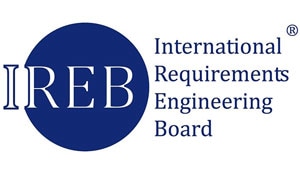Requirements Elicitation and Consolidation
Register now
About the training
Finding the right requirements and coordinating them with stakeholders are essential tasks in requirements engineering. How stable requirements remain over the course of a project depends on a clear, complete and accurate definition of those requirements. Review techniques, linguistic checks of natural language requirements and being able to work professionally with stakeholders all contribute significantly to this process. This course places particular emphasis on intensive exercises related to the various techniques and methods.
Certification – IREB® CPRE Advanced Level
The seminar is based on the current IREB® syllabus and prepares you to take the exam to become a Certified Professional for Requirements Engineering Advanced Level – Elicitation and Consolidation, which you can take following the last day of the course. To prepare you for the certification exam, our Web App is available with detailed learning and exam questions.
Target Group
analysts, requirements engineers, project managers, product managers, quality managers
Prerequisite
IREB® CPRE Requirements Engineering – Foundation Level (recommended)
The CPRE Advanced Level Exam – Elicitation and Consolidation exam requires the CPRE Foundation Level Exam.
Content (Details as PDF – German)
Requirements engineer skills for determining requirements
- Schulz von Thun communication model
- Change processes and their mechanisms
- Using self-reflection and outside reflection
- Structuring personal development
Requirements sources for determining requirements
- Identifying, classifying and managing stakeholders
- Use of classification schema like the onion layer model
- Stakeholder relationship management techniques
- User-centered requirements engineering
- Involving major stakeholder groups
- Using the persona method for virtualized stakeholders
- Identifying, classifying and managing documents
- Identifying, classifying and managing existing systems
- Documentation schemas for requirement sources
Survey-based investigation techniques
- Classifying and selecting investigation techniques based on their characteristics
- Making use of qualitative interviews
- Developing and making use of requirement questionnaires
- Apprenticing
- Contextual inquiries
Creativity techniques for requirements engineering
- Brainstorming and brainstorming paradox
- Method 635
- 6 hat thinking
- Analogy techniques
- Osborn checklist
- Random stimuli
Artifact-based investigation techniques
- System archaeology
- Perspective-based reading
- Reusing requirements
Techniques which support requirements gathering
- Prototyping
- User walkthrough
- Scenarios and storyboards
Using goal definitions in requirements determination
Agile determination of requirements with user stories
Conflict management methods for requirements engineering
- Being able to recognize different types of conflicts in projects
- Being able to classify conflict intensity according to the Glasl model
- Knowing and being able to select methods for conflict management
- Being able to use analytical support methods to handle conflicts
Note
The certification exam will be offered after the third day of the seminar. It consists of a multiple choice test and a written assignment. There is an extra fee for the certification exam – you can find information about the examination modalities and fees on our certification overview page.
Are you looking for more?
We offer you this course as an inhouse training for your company. Here you can learn more about our service packages. Tell us more about your needs, so that we can tailor an offer that perfectly fits your requirements.
We offer this course also on several dates as a webinar and face-to-face training in German. You can find all upcoming dates for our open trainings in German on our Website.


